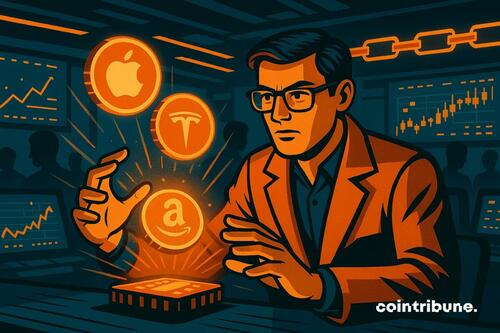Authored by Kathleen Kinder via CoinLaw.io,
OpenAI has publicly rejected Robinhood’s new “OpenAI tokens,” clarifying they do not represent actual equity in the company.
Key Takeaways
OpenAI disavowed Robinhood’s tokenized equity products, stating they do not grant real ownership in OpenAI.
The tokens offer indirect exposure through a Special Purpose Vehicle, not direct shares.
Elon Musk and others have criticized Robinhood’s efforts as misleading.
The move highlights growing tensions between crypto innovation and traditional private equity rules.
In a clash that is drawing widespread attention across finance and tech circles, OpenAI has forcefully rejected Robinhood’s latest effort to sell “OpenAI tokens” to retail investors. The controversy erupted after Robinhood announced it would distribute these tokens to European Union users, promoting them as a way for everyday people to gain exposure to private company equity using blockchain technology. While Robinhood framed the move as a step toward democratizing finance, OpenAI and key industry voices have condemned the tokens as misleading and lacking in substance.
OpenAI’s Public Statement: No Equity, No Endorsement
OpenAI, the well-known artificial intelligence company, issued a rare public statement from its official newsroom account, clearly distancing itself from Robinhood’s offering.
“These ‘OpenAI tokens’ are not OpenAI equity. We did not partner with Robinhood, were not involved in this, and do not endorse it. Any transfer of OpenAI equity requires our approval—we did not approve any transfer. Please be careful,” the company wrote on X.
These “OpenAI tokens” are not OpenAI equity. We did not partner with Robinhood, were not involved in this, and do not endorse it. Any transfer of OpenAI equity requires our approval—we did not approve any transfer.
— OpenAI Newsroom (@OpenAINewsroom) July 2, 2025
Please be careful.
OpenAI’s response was triggered by Robinhood’s announcement earlier in the week, in which the fintech platform rolled out tokenized shares of OpenAI, SpaceX, and other major private firms. These digital assets were distributed to select users in the EU as part of a promotional giveaway.
Robinhood’s Defense: Democratizing Private Assets
Robinhood’s leadership responded by defending the program, emphasizing that the tokens are designed to give retail investors indirect access to previously exclusive markets. A spokesperson for Robinhood clarified, “These tokens give retail investors indirect exposure to private markets, opening up access, and are enabled by Robinhood’s ownership stake in a special purpose vehicle.”
Robinhood CEO Vlad Tenev echoed this sentiment, stating, “While it is true that they are not technically ‘equity,’ the tokens effectively give retail investors exposure to these private assets. Our giveaway plants a seed for something much bigger, and since our announcement we have been hearing from many private companies that are eager to join us in the tokenization revolution.”
The company rolled out the tokens as part of a broader effort to introduce tokenized stocks and real-world asset trading for European customers, building on a newly launched layer two blockchain network for settling tokenized equity trades.
What Are Investors Actually Buying?
Despite Robinhood’s promotional messaging, the underlying structure of the tokens is complex and layered.
Investors are not purchasing actual shares of OpenAI or direct stakes in the company.
The tokens represent contracts linked to Robinhood’s ownership interest in an SPV, which itself holds shares of private companies.
This means buyers are two steps removed from actual equity, and the value of the tokens may diverge significantly from the true value of the underlying shares.
According to Robinhood’s help center, users buying these tokens are acquiring “tokenized contracts that follow the price” of the underlying assets, recorded on blockchain.
Industry Pushback and Criticism
The move by Robinhood has attracted strong criticism, both from within the industry and from high-profile figures.
Your “equity” is fake
— Elon Musk (@elonmusk) July 2, 2025
Industry analysts note that private companies typically guard their cap tables and limit share sales to selected investors, making Robinhood’s approach unusual and controversial.
In similar instances, other startups like Figure AI have sent cease-and-desist letters to brokers marketing unauthorized share sales, underlining how sensitive private companies are about third parties trading or referencing their equity.
Broader Context: Tokenization and Financial Inclusion
Robinhood’s foray into tokenized private equity reflects a larger trend in finance, where crypto exchanges and platforms seek to offer access to previously inaccessible asset classes such as private equity, private credit, and commercial real estate.
CoinLaw’s Takeaway
This episode is a clear signal of the growing friction between fast-moving crypto innovation and the strict, carefully controlled world of private company finance. While Robinhood presents tokenization as a breakthrough for retail investors, OpenAI’s sharp rebuke makes it clear that not all stakeholders see it that way. Investors should scrutinize exactly what is being offered and recognize that buying a token does not always mean owning a share in the world’s biggest private companies.
Source link


